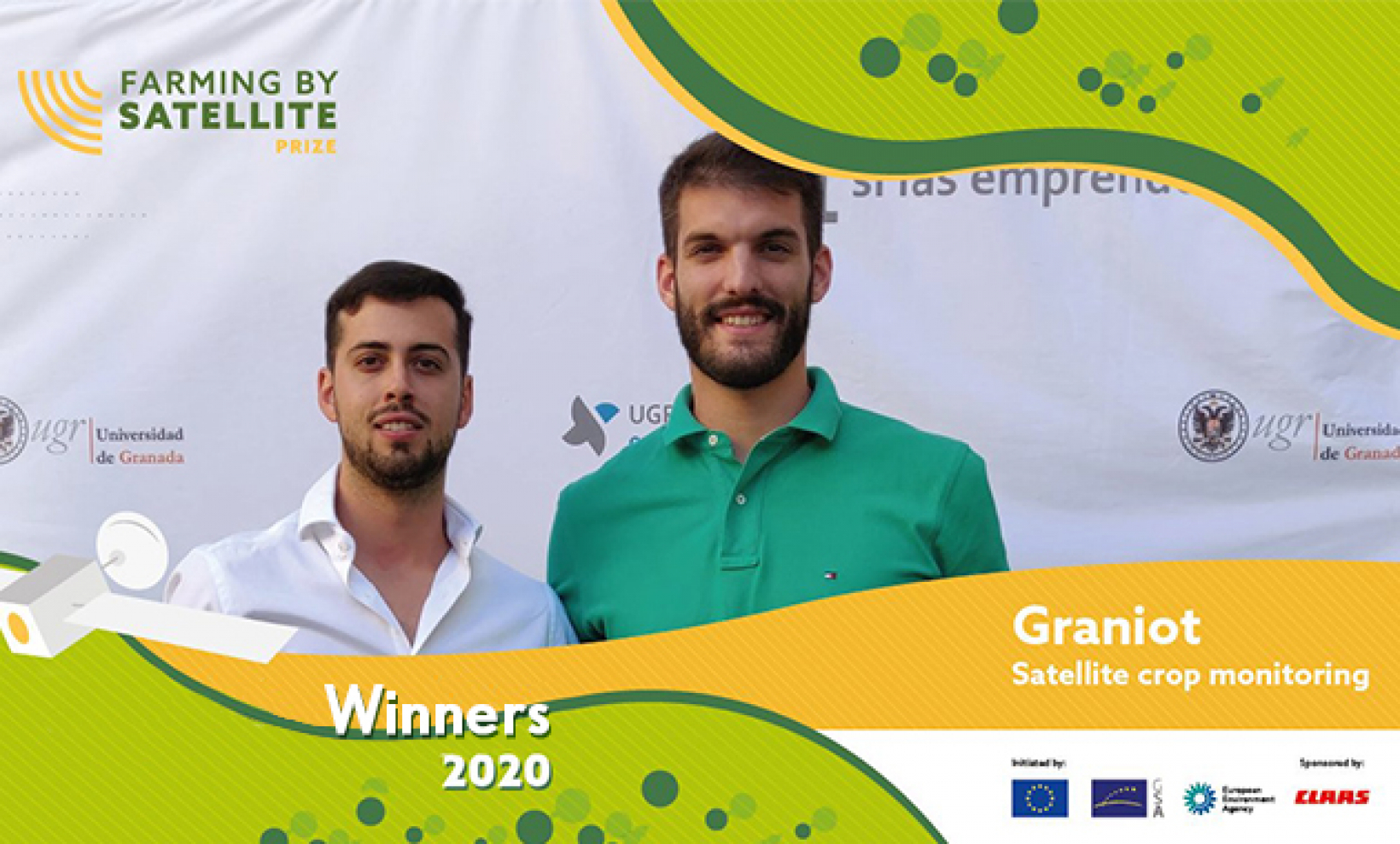
Graniot, a team from Spain, has won this year’s 1st Farming by Satellite Prize. The winning team developed a web application that uses European satellite technologies to help agronomists and farmers monitor crops, reduce water waste and avoid poor fertilisation practices. The Farming by Satellite Prize promotes the use of GNSS and Earth observation in Europe and includes a special Africa Prize.
The Italian team Genuine received second prize in the competition for a web-based solution that identifies crop stress the optimal tractor path for irrigation and fertilisation using Copernicus, EGNOS and Galileo. The third prize went to AI4OceanFarming, also from Spain, for a solution that uses satellite data to identify ocean farming threats such as harmful algal blooms (HABs), ocean acidification (OA), and invasive species. Finally, the Special Africa Prize went to the Kenyan-Italian team GeoM&E for a solution that uses European satellite technology to monitor coffee diseases.
The winners beat stiff competition from 40 other young teams with innovative ideas. The judges selected first a short list of the best teams to then take their ideas forward to a ‘Deep Dive’ phase. The selected eight grand finalists had the opportunity to pitch their solutions during a final ‘live’ judging round.
An inspiring experience
“We’re honoured to be chosen as winners of the Farming by Satellite Prize 2020. We will put the EUR 5,000 cash prize to good use developing our satellite crop monitoring web application further. The whole journey has been a great experience that would not have be possible without the support of UGREmprendedora and the Andalucia Agrotech Digital Innovation Hub,” said Pablo Romero Díaz and Manuel Castro Ruiz from Graniot. “We’ve learnt so much. We have been inspired by the feedback from the judges and have enjoyed seeing the entries from all the grand finalists during the awards ceremony.”
Read this: A “Cerealist’s Diary”, the testimony of a wheat farmer
“The innovation and wide variety of agriculture applications submitted by young innovators this year has been wonderful to see. It confirms the value of encouraging the next generation of farmers to explore the use of satellite technologies in agriculture to enable sustainable farming practices,” said Joaquín Reyes González, who judged the competition on behalf of the European GNSS Agency (GSA).
Hans Dufourmont, a judge for the European Environment Agency (EEA), highlighted the environmental credentials of the entries: “The agricultural sector needs to continue developing sustainable food production practices and improve their impact on the environment and climate. It’s great to see Galileo and Copernicus convincing young farmers to become tech savvy entrepreneurs and develop competitive yet sustainable agriculture.”
Increased use of EGNSS and Copernicus in agriculture
The Farming by Satellite Prize is an initiative of the GSA and the EEA, supported by agricultural engineering equipment manufacturer CLAAS. The competition aims to increase the use of Galileo, EGNOS and Copernicus in European agriculture. The Prize also intends to raise awareness on the benefits the EU Space Programme provides toward fostering innovative and sustainable farming solutions. The objective of the Special Africa Prize is to encourage young Africans to develop satellite-based solutions that cater to the specific needs and resources of communities and lands in Africa.
Watch this: European Satellites for Agriculture
Commenting on the winning idea, Marcel Fölsch from CLAAS said: “The Graniot team has consistently presented a high-quality solution throughout all stages of this year’s competition. It is great to see their focus on olive farming in southern Europe, allowing them to narrow in on specific customer needs and present a compelling remote sensing solution to their users. We’re pleased to award the top prize to a team clearly driving the adoption of sustainable agriculture practises in Europe.”
Contestants were tasked with creating a new sustainable and environmentally friendly agriculture solution using Galileo, EGNOS and/or Copernicus. Solutions had to demonstrate a novel approach to the use of satellite services for farming, while ensuring accurate technical feasibility and a maximum impact on the farming industry.
Participation was open to young farmers, academics, and professionals between the ages of 18 and 32. They could take part as individuals or as a team of up to four. For the Special Africa Prize, at least one applicant was required to be a citizen of or resident in an African country.
For more information, click here.

